#does this count as a spoiler??? I feel like this may be incomprehensible to those who don't know
Explore tagged Tumblr posts
Text
Sigma: Would you still love me if I was a frat bro?
Diana: Is this some sort of hypothetical?
Sigma: No, I will be turning into a frat bro in the near future whether we pursue a relationship or not... because of the curse. I just thought I should warn you.
#sorry just a peak into my dark and twisted mind#sigma klim#diana zero escape#zero escape#zero time dilemma#ztd#rambles#zero escape spoilers#does this count as a spoiler??? I feel like this may be incomprehensible to those who don't know
78 notes
·
View notes
Text
Tangled the Series Character Analysis: Childhood Trauma POV
I can't believe Tangled the Series really created two incredible antivillains and threw them in direct contrast with the pre-existing golden couple. I love what the showrunners did with the main quartet, so I made a very subjective analysis post about it from a Childhood Trauma POV. (Spoilers, obviously.)
The Boys

The series' focus is on Rapunzel, and by association her direct opposite, Cassandra, so the boys get comparatively less screen time. But it doesn't take long to figure out that Varian is meant to be a parallel for Eugene—these are two people dealing with the absence of parental guardians, struggling to reconcile the lives they previously had with their changing ideals in relation to a less-than-perfect Father Figure.
They both respond to the helpless state of being young, alone, and powerless by trying to take back power in any way they can. Eugene reinvented himself and buried his desires for a family. Varian throws in everything he has into recovering what he lost, because he's a child and the best solution he can think of is to return to the familiar safety of his father's presence. A significant portion of his desperation is fueled by fear of his father’s disapproval, because as much as Quirin loves Varian, he wasn’t the dependable voice of support. Varian needs approval from outside sources, which was also Flynn Rider’s purpose in life, once upon a time. (Again, parallels.)
Throughout the series, the boys' relationship with each other transforms from exasperated incomprehension to easy understanding. The process is hastened as Eugene lets himself realize he cares a lot about troubled kids who remind him of himself. He becomes aware that children should not be required to survive on their own like he and Lance had. Spurred on by his significant other's love and encouragement, Eugene is able to acknowledge the adverse affects of his childhood on his life and start moving on. His extending a ready hand to Varian is his process of healing. Though Eugene's first priority will always be Rapunzel, he truly wants to save Varian from the uncontrollable volatility of risky decisions because he knows that downward spiral intimately.
Of course, there is a difference between thieving from the rich and planning the destruction of a kingdom. We'll get to that later.
The Girls
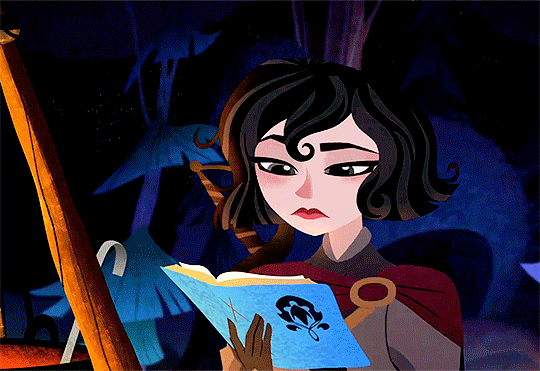
Rapunzel and Cassandra are the biggest driving forces of narrative power in the show, and they are survivors of child abuse. Every one of the main quartet has Parent Issues, but Rapunzel takes the crown (figuratively speaking) with this one. She was kidnapped and groomed into a life-giving doll, and she was only able to escape her abusive adoptive mother through incredibly traumatizing means. For Cassandra, it was neglect, and even her loving adoptive father couldn't leviate the scars left on her childhood mind.
They're a classic case of Golden Child vs. Scapegoat, which is a common case seen in siblings raised by Narcissistic parents. When one child is "favored" more than the other, the kids experience vastly different childhoods, resulting in resentment that stems from their inability to understand each other. Rapunzel and Cassandra are both jealous of what the other had—Rapunzel wants Cassandra's casual, practiced ease with freedom and personal agency, while Cassandra wants the attention and respect that Rapunzel is given by the status of her birth. Because they're unwilling to speak candidly about the unique hardships of their childhood, what results is a series of miscommunications that put a strain on their friendship.
Cassandra and Rapunzel both want the other in their lives, but how they attempt to make that connection is very different. Cassandra wants to be a helpful, essential force in Rapunzel's life. Unfortunately, Rapunzel has been raised on the idea that when push comes to shove, no one will help her survive. Cassandra interprets Rapunzel's desire for independence as Rapunzel scorning the connection that Cassandra is attempting to create. Add in some manipulation from an ancient evil, and Cassandra decides she is done exhausting her emotions for Rapunzel.
Rapunzel, on the other hand, wants absolute honesty in her relationships. Gothel raised her on lies, so she spurns deception. But Cassandra knows the merits of protecting herself by holding her opinions in, which is where the misunderstandings occur. Rapunzel cannot trust someone who isn't completely forthright with her. She's tired of dealing with liars, and she grows afraid that Cassandra will cause her the same pain as Gothel did. But the thing is, Cassandra is not Gothel, and Rapunzel loved Gothel. She couldn't save Gothel, but maybe she can save Cassandra. It's not too late.
Rapunzel doesn't know when to give up on Cassandra because she is aware that she and Cassandra are similar people. Giving up on Cassandra would feel too much like giving up on her own hopes for a happy life. Rapunzel can't let Cassandra be unhappy. This princess cares too much, loves too hard. She never learned how to write people off because you can't survive a childhood like hers with that much cheer if you don't hang onto your optimism like a goddamn lifeline.
This is Rapunzel’s method of taking back power for herself: saving others. Rapunzel could have been Cassandra. Rapunzel is trying to believe she herself is worth saving—therefore, Cassandra must be worth saving as well. Rapunzel's significant other is giving her a stable source of love and support, but without a proper resolution to Cassandra's struggles—a final proof that despite Gothel's influence, they can both be happy—Rapunzel would feel incomplete.
The Golden Couple
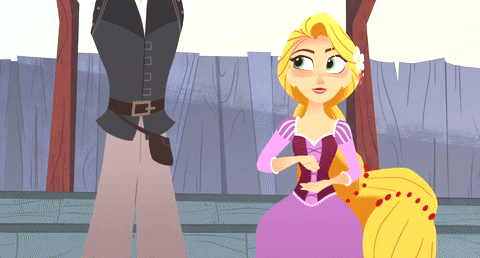
At the end of the day, Rapunzel and Eugene are fundamentally good people. If it comes down to it, they would be unable to sacrifice the world for their own desires. (Eugene's thievery doesn't count as an expression of true desire because it was literally his method of survival. An expression of true, selfish desire for him might've been something like manipulation and abduction for the purposes of making people stay, but Eugene is not Gothel and he would never do that to anyone in a million years.) (On a side note, Rapunzel's selfish desire might've manifested in the abandonment of all duties and personal connections in favor of eternal exploration, or revenge towards a kingdom that failed to save her, or a thorough destruction of authority figures—but she loves people too much and would never be able to forsake her family.)
Life threw a lot of rocks at them, but these two came through it marginally well-adjusted. They affirmed their love for each other in a violent, unforgettable manner, which makes it easier for them to trust in each other's affection. Eugene would've been okay with never finding his biological father, just as Rapunzel had been okay with her biological parents' inability to protect her. They have no wish to punish the world for what they suffered. They’re content with who they are. They're just glad they made it, that they're finally allowed to love someone without being afraid. They're each other's saving grace.
The Antivillains
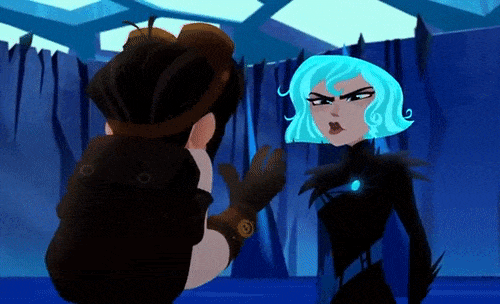
This is the difference between Hero and Antivillain: Cassandra and Varian are willing to punish the world for what happened to them. There’s a very faint line between justified retaliation and venting. In their desperation and anger, they cross the line, and they’re unable to stop themselves once they get going. Unlike the Golden Couple, Cassandra and Varian refuse to settle. They want what is owed.
Also, they really, really hate themselves. (This is important.)
Varian believes Quirin is the ultimate source of affirmation. The fact that he lost his father by way of his own dangerous experiment, coupled with the fact that no one prioritizes his call for help in the face of national disaster, is enough to make him feel isolated from the world. Though he is burdened with a growing sense of remorse for his deeds, he doesn’t stop resorting to drastic, harmful measures to get his father back until he is forcefully stopped by betrayal from his allies. He finally makes the full transition from “antagonist” to “protagonist” when Rapunzel risks herself to save Quirin from the rocks. If Quirin could not be saved, there’s a possibility Varian might have stayed an antagonist, unenthusiastic though he may have been in his villainous role. As long as Quirin is trapped in those rocks, Varian remains the villain who put him there.
With Quirin safe, Varian allows himself to take huge steps in healing. He slowly rediscovers his self-worth, one that is separate from Quirin’s approval. Rapunzel—and by extension, Eugene—play the friendly, supportive role to Varian’s ingenuity, helping him along in his quest for self-acceptance. Varian still has trouble working through the heavily ingrained self-hatred, but he recovers enough confidence in his own judgment that he takes Eugene’s warning to heart and is able to install a safety device in his father’s helmet, just in case.
This is the Varian who meets Cassandra in the Tower that once belonged to Gothel. At this point in time, Cassandra has been manipulated into thinking of herself as weak and unimportant in comparison to Rapunzel. Her adoptive father, much like Quirin, was too gruff to be vocal with approvals. Her efforts have not been met with successes. She feels like a failure, and she hates feeling like a failure. This is Cassandra’s method of taking back power: by turning herself into someone unforgettable. If she can make something of herself, she’ll finally be able to prove Gothel wrong. She can be just as special as Rapunzel, if she’s given the chance. She wants that chance.
Similar to Varian, Cassandra doesn’t stop her downward spiral until her supposed ally and mentor betrays her and forcefully takes her power away. Only when there are no options left does she allow herself to admit that she was wrong. She is then rewarded for her honesty with Rapunzel’s love and trust. Armed with a new confidence, the sisters vanquish the evil together in an epic showdown that will long be remembered. Cassandra finally gets her dramatic hero’s tale.
Rapunzel and Eugene have an internal compass that lets them make snap decisions. They don’t have the healthiest self-esteem, but they can at least stand by what they think is right. Comparatively speaking, Cassandra and Varian have terrible self-esteem. They don’t trust their own judgment and are heavily influenced by outside forces. Without the constant barrage of trust and affection from Rapunzel, who is akin to a blazing sun when it comes to personal loyalty, these antivillains might never have reached their redemptive ending. They wouldn’t have been able to let go of their twisted priorities without outside influence. Can’t blame them for it, though.
It’s no surprise that Cassandra and Varian are relatable to many people. Who wouldn’t want to reclaim what was taken from them during childhood? (Of course, the problem occurs when you start hurting others to reclaim what you lost.) Their journey is a different kind of vulnerable from Rapunzel and Eugene’s journey, and it’s extraordinary in its detail. This show is essentially a long exploration of the various ways a parent can mess you up and the coping methods of kids who want to become more than their past, which is totally up my alley of expertise. I’m grateful I got to watch them grow taller than their trauma.
Finally, here’s a parting gif of Lance, because I love him and he’s a well-adjusted ray of sunshine. We all wish we could be as mentally stable as Lance—the main quartet included.
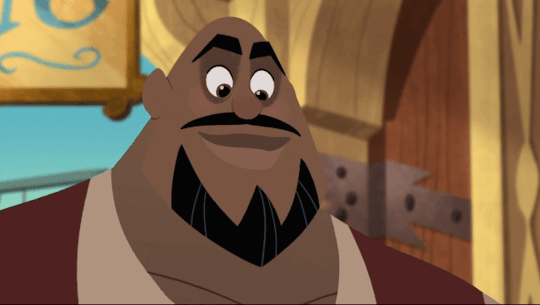
#tangled the series#rapunzel#cassandra#varian#eugene fitzherbert#character analysis#my thoughts#child abuse#trauma recovery#when the villain origin story is self-hatred
302 notes
·
View notes
Text
[QZGS meta] what’s in an OP? dawning glory (pt 1)
or, why TKA S2′s OP is actually really good
{The King’s Avatar season 2 premieres in less than 24 hours!}
(part 2) (part 3)

Ever since I got into The King’s Avatar, I’ve always wondered what a “classic-anime-style” TKA opening would look like. OPs are something I pay a lot of attention to, both for the sheer enjoyment and hype as well as the deeper story and symbolism they may allude to. And although I enjoy the S1 and OVA OPs for what they are, I always wanted an OP that really followed the tried-and-true formulas, an OP that gave a proper look at what the series was really about, an OP that had a lot to dig into and analyze.
S2 brought us this kind of OP, finally, and I’m very excited to see it. Heavily inspired by the “What’s in an OP?” youtube series by Mother’s Basement, I really wanted to try and break down this OP. Because things got very long, this is only part 1; the other 2 parts are linked above and below.
Some of the points I bring up may be reading too deeply, but whether some of these details were intentional or not, their meanings and effects are still worth analyzing. Also as a warning, there will probably be novel spoilers.
For reference, watch and read the lyric translation here.
With all that said, let’s jump right in.



We open with some very nice shots of the morning light streaming in, shining on the gamers’ tools of the trade. Right away, the new animation studio promises us a visual treat - the lighting and colors are excellent. Although the props are unmoving and there are no living beings in these shots, the changing angle of the light adds motion to the scene, giving the impression of a sped-up sunrise. This accompanies the music well, which starts out muffled and distant, and gradually comes into clarity. From the very beginning, the OP grabs our attention and holds it, building our anticipation for what’s to come.
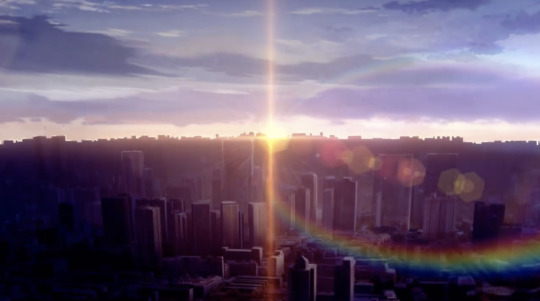

Now we cut to outside, atop a roof, and we get a proper look at the sunrise - only for a brief moment, though, as Ye Xiu’s hand quickly comes up to block the blinding light. “Anime protagonist staring at sunrise” is a pretty common trope, but I think it’s used to nice effect here - we’re introduced immediately to the “dawn” motif that underlies this entire OP (it’s even in the title). It’s a suitable motif for this arc of the story, because this is where Ye Xiu finally has the concrete goal of building up his own team - this is truly the dawn of Team Happy.
I like how it’s Ye Xiu’s hand that’s the first thing we see of him, or of anyone. As a pro, his hands are the most important part of himself; his hands are also one of the first things that Chen Guo notices about him when she first meets him.
Furthermore, this view provides a nice natural transition to the next shot, in which we finally get to see him properly.
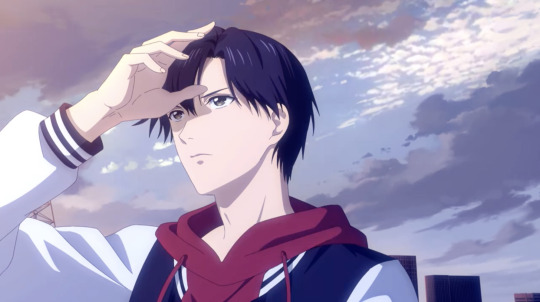

Look at how pretty the sky looks! Look at how pretty his smile looks!
After the first few seconds of pure buildup in the music, the beat kicks in at the exact same time as his hair begins to blow in the wind. I think it’s very important for the visuals and the music to sync together in an OP, simply because of the raw impact this has on the viewer - they reinforce each other’s effects. Both components of an OP need to work well together in order to create something greater than the sum of the parts. It’s just very exciting, when you can sit back and think “oh yeah, it’s all coming together.”
Ye Xiu stares thoughtfully at the sunrise for a few moments, before breaking into a soft, relaxed smile (right on the second four-count after the beat starts). It’s not one of his mocking smiles, or his shamelessly confident smiles - here he’s just genuinely happy and hopeful at what the future has in store.
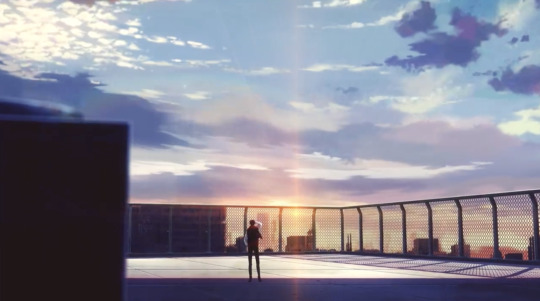

We see him lower his arm, and then the camera pans upward to a shot of the new series logo for Season 2. This pan-up to title card is also a fairly standard technique, but hey, it’s effective and efficient at getting us ready.
Speaking of the new logo: it’s basically the same as the old, but I was shocked to see just how prominent the English title “The King’s Avatar” is now. Honestly, it’s really exciting to see - feels like it adds some legitimacy to our small English fandom, and it’s also so cool, knowing how the title “The King’s Avatar” became the official English name almost by accident - we could have easily ended up with something much less interesting. However I do think they could have positioned the text a little better, because I and others keep reading “The King’s Iavatar” haha

As the dawn shifts more into morning, we refocus on Happy Internet Cafe, the origin of it all. Notice the new green leaves on the tree: our story began on a snowy winter, but we’re now firmly in spring, a time of new beginnings.
The music excitement level settles down a little as we enter the first verse, and here we get a montage of many of the to-be Team Happy members. Although each shot is fairly short, each manages to tell a story, conveying a good amount of information about the character in question. One of TKA’s strengths is its large cast of well-developed characters, and I’m really glad to see that they’re not completely flattened out in this opening montage.
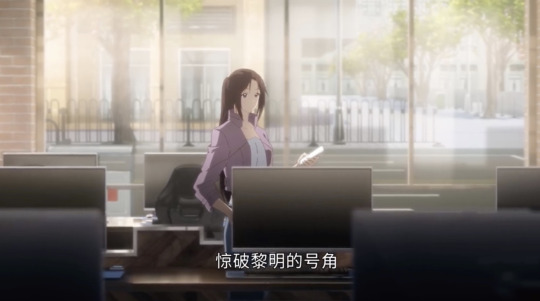
Here we see Chen Guo, presumably opening up the cafe for the day. However, by the time she comes down here to do this, it seems that Tang Rou has already been awake and training for a while.

Like Ye Xiu, the first thing we see of Tang Rou is her hand, a parallel that perhaps emphasizes how deep Ye Xiu’s influence on her is and how she wishes to learn from and surpass him. The nimbleness of her fingers on the keyboard definitely evokes the image of a pianist - a subtle clue for the future.
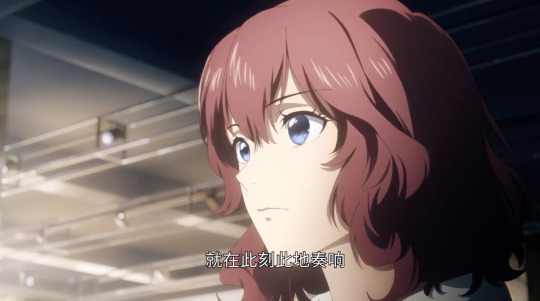
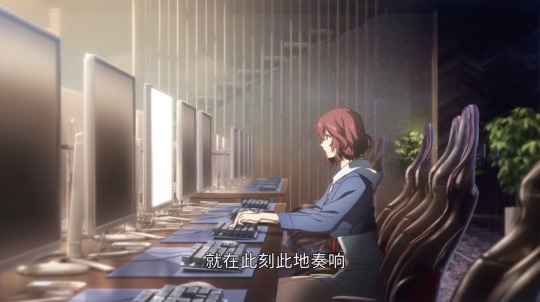
Look at her straightened back and serious eyes - her posture and expression say it all. Awake, alert, steady, calm, as she continues to strive for improvement.
The lyric for this part is roughly, “the bugle call to split open the dawn is sounding right here and now.” As mentioned, it’s here at Happy Internet Cafe that it all begins.
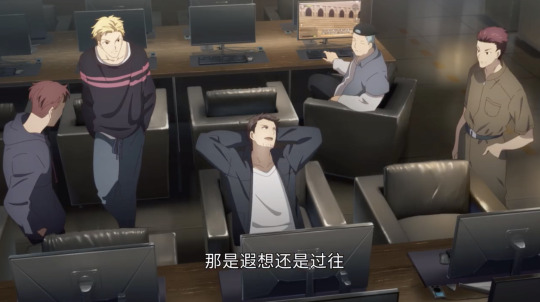
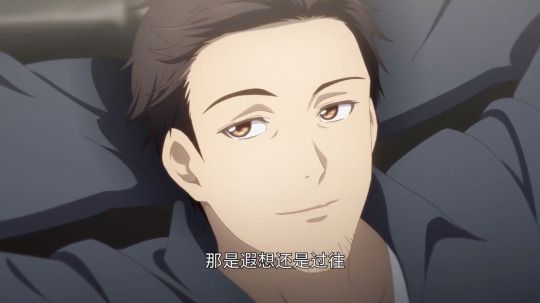

From one internet cafe to another, it’s Wei Chen and his bros! Notice how he’s at the center of their little group, in both position and attention - we immediately get the sense that he’s their leader. Slouched against the couch (which seems to be built more for comfortable lounging than proper gaming), hands behind his head, glancing between his friends, an easy smile, it all gives off a relaxed, casual air of confidence.
Still, in contrast to the seemingly light-hearted mood of this scene here, the accompanying lyric is somewhat melancholy: “were those daydreams or the past?”
When Wei Chen’s character design came out, a lot of people were surprised at how young he seemed to look, and he has barely any stubble. But with this close-up of his face (which is specifically timed to “or the past”), the lines under his eyes are clear to see. Combined with the lyric, there’s suddenly something sad beneath his smile here. He’s not young anymore.
Notice the one screen that’s turned on behind him - clearly an image of Glory. Despite everything, he couldn’t bring himself to leave this world entirely.
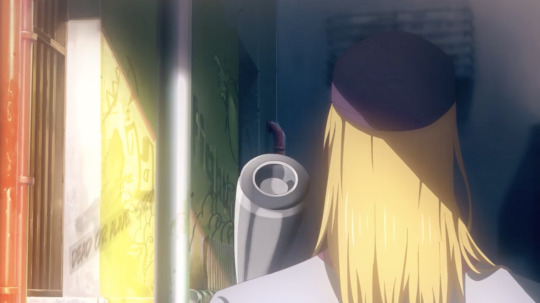

Where the hell is Steamed Bun? Why does he have a bat? We just don’t know. We don’t even have any lyrics to give us a hint. He’s a real-life Brawler, totally incomprehensible. Even the camera shakes a bit erratically as it tries to follow his movement. Honestly, isn’t this just the best way to sum up his character?
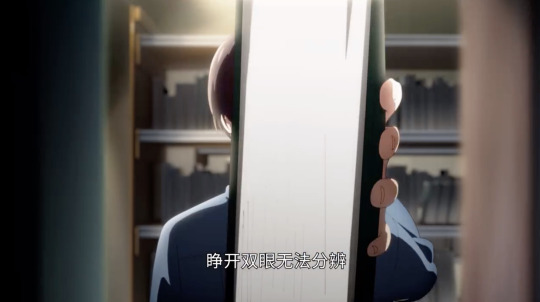

Our favorite math nerd Luo Ji, in a library of course. The shot begins with everything blocked off by the books, and it’s only when he pulls out one of the books (the black-to-light is timed with the lyric “I open my eyes”) that we’re able to see him. He’s still framed by the books in this shot, because he’s first and foremost still a student. For now and for a long time to come, his studiousness and mathematical ability will be what defines him and his contributions to Team Happy.
Still, he looks thoughtfully at the book in his left hand. Maybe his contributions can go farther. Pay attention to his character Concealed Light when we see him later.
I can’t say if there’s a significance to the woman passing by, but it serves its purpose as a transition to the next scene.

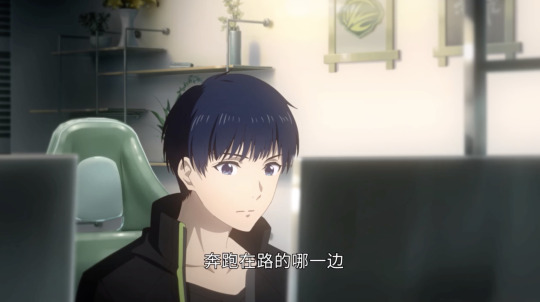
Qiao Yifan! From the logo in the back, as well as his uniform and color scheme, you can see he’s still at Tiny Herb here. He looks determined and focused on his screen at first. When he blinks, though, his gaze subtly shifts to the side and down. Something is distracting him; he’s not quite as certain as he might appear at a glance.
The lyric here is “[I can’t tell] what side of the road I’m running on,” an apt reflection of his current, conflicted and somewhat precarious situation. He’s on a championship team right now, a place that so many would envy. But he feels much more at home with the ragtag crew from Happy. But what prospects do they have? But it’s not like he has much of a place in Tiny Herb right now either…


From Qiao Yifan looking to the side, we cut to An Wenyi looking to the side - our eyes are able to very naturally follow the transition. Although blurry at first, we soon see that he’s looking at a figurine of Immovable Rock - the number one Cleric in Glory, An Wenyi’s idol. He looks at it thoughtfully for a moment, brows furrowed, before turning away and closing his eyes. As though in resignation, knowing he’ll never be able to reach that level.
The lyric is, “do I understand” - a very short line, with the note held out.
An Wenyi is the logical one; he’s the one who understands. He understands his current position, he understands that he has no hope as a pro with his current skill, he understands that the chance Happy is offering him is a once-in-a-lifetime kind of opportunity for someone like him. It’s a decision he considers carefully, he’s unafraid to ask bold questions about the practicality of what Chen Guo and Ye Xiu are trying to do, but in the end he knows this isn’t something that he can pass up.
I like An Wenyi’s character arc a lot. There’s a lot of worry and self-doubt in his expression as he looks at that figurine; there’s a lot of sadness as he turns away. Even through Season 10, this aspect of him doesn’t just magically disappear - he has to deal with this reality of being Happy’s weak point. His logical mind is both his greatest strength and his greatest weakness.

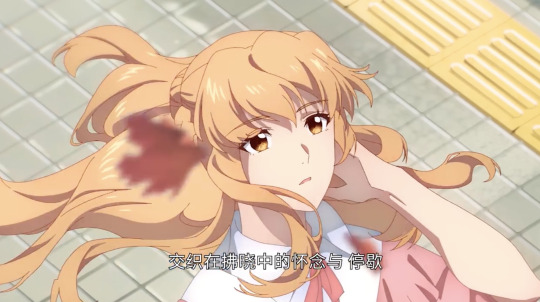
From An Wenyi’s closed eyes, we cut to Su Mucheng’s downcast eyes - another natural eye-focused transition. She looks up as the wind picks up around her, blowing her hair and scattering leaves.
Notice that she’s not wearing her Excellent Era uniform here. Her dress reminds me of her outfit from the prequel movie, actually - color scheme, sleeves, bow, length, cut, etc.
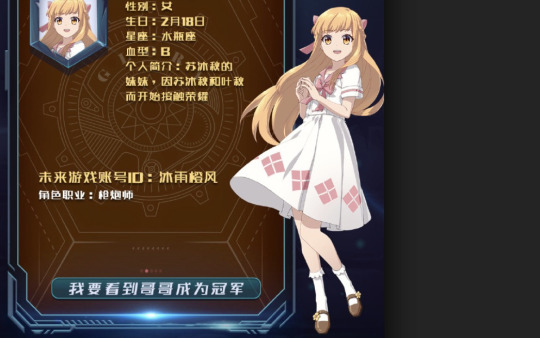
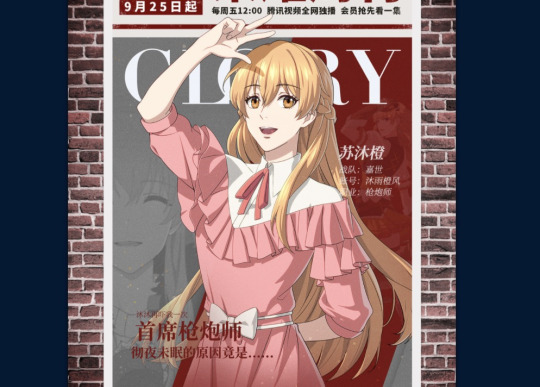
It’s a style calling back to younger, simpler times. The light pink color adds to that effect as well.
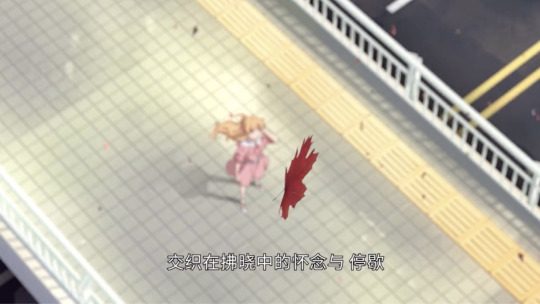
As the camera pulls out, we’re able to see just how alone she is, isolated from the cars passing beneath her, not a single other person nearby. And at this point in the story, she really is rather alone; she doesn’t really have any allies on the team, and her only escape is to play in the game with the Happy crew.
The wind is scattering many leaves, and she blurs into the background as the camera focuses on one drifting red maple leaf in particular.
Blatant symbolism is blatant (it’s not even fall right now, it should be early spring…). Still, it’s a convenient shorthand to reference many things. One Autumn Leaf, Ye Xiu’s account and identity for a decade, now snatched away. The symbol of Excellent Era and those earliest hopes and dreams, now lost to the wind. It could even reference Su Muqiu himself, the boy with “autumn” in his name, now lying in eternal rest.
The lyric is, “interwoven in the dawn, those memories and rests.” The past is now past, far out of reach; all we can do is look up and reminisce on what once was.
Over the course of these shots, you can see the passage of the morning. The earlier characters are illuminated by a golden glow, but by the time we reach Su Mucheng, she’s standing in full daylight. Here we end section 1 (verse 1), and move onto the next part of the song.
Thanks for reading so far!
(part 2) (part 3)
28 notes
·
View notes
Text
[ I N F E R N A . . . ]
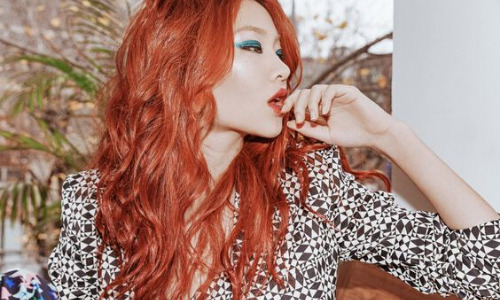
Real Name: Victoria Chang (goes by “Vicky”)
Age: 22
FC: Hoyeon Jung
Species & Class: Fire-Mage, Rogue
Guild: Obsidian
“Middle finger up, F you pay me” —Blackpink, Boombayah
Description of In-Game Powers: Inferna (Vicky) can generate and manipulate fire. She should theoretically be able to put it out, too, and control it in a more precise way, but so far, no luck. Over-using this ability results in dizziness and fatigue.
In addition, Inferna has a natural affinity for fire-related ability scrolls, potions, and items. She is invulnerable to fire, though water and being underwater in general gives her up to -2 in defense.
Place of Birth: The suburbs surrounding Baltimore, USA
Appearance: Although Inferna’s natural hair color is black (technically, dark brown), she had it dyed red when she first got to college. In-game, she changes her hair color very often, utilizing a bunch of H-rank potions that are only there for cosmetic effects. She also gives herself a bunch of face tattoos in-game, just because she can. Currently, she has some of the lyrics from Blackpink’s DDU-DU DDU-DU tattooed around the area of her left eye, like so.
“I just think that it’s kind of lame that there isn’t even a Starbucks out here. I mean, all this fancy mead is fine and all, but sometimes I just really want a frap, you feel me?”
Places Most Likely to be Found In-Game: Inferna adores the Level 7 Tearoom. She’s always been keen on spilling the tea, both literally and metaphorically (plus the sweet treats don’t hurt!).
Inferna’s also a pretty regular sight in Yue City, trying to market her Inferna Sauce and Inferna Sriracha to beginner players.
Current Inventory:
Flaming daggers x4
Regular daggers x2
Pocketknife x1
Silver dust x5
Dispelling amulet x1
Crossbow x1
Ignitium potion x2
Lock picking set x1
Ictuium potion x7
Black pearls x3
Blue pearls x3
“Inferna Sauce” (AKA hot sauce that tastes like Lao Gan Ma/chili sauce that she made using in-game ingredients to spice up the bland-ass white people food available in the marketplaces) x10
“Inferna’s Sriracha” (same deal ^^^) x14
Shortsword x1
Murmurationium x1
Assorted sweet treats from the Tearoom x22
+ assorted foodstuffs/drinks, and more coins than anyone would ever need because she’s such a goddamn hoarder
Strongest Character Trait: Flippant
“Leak college textbook pdf files, not nudes. Jeez.”
Strengths: Inferna’s a total boss at League of Legends (she was Diamond before she decided to check out Gem Quest), meaning that she’s pretty familiar with a lot of the game mechanics that GQ was founded on; in-game, she’s very good at appearing out of nowhere and then fucking off with whatever she decided that she wanted to steal; despite the fact that she thinks computer science is boring as all hell, she’s not bad at it - she hasn’t failed so far, which is a sign that she must be doing something right; somehow passing 3 years of CS courses means that Inferna’s pretty well-versed in a variety of programming languages (Python, Java, Haskell, Ruby, C++, etc); has a very good memory, despite her general flightiness; her in-game character is very speedy, if not always very stealthy; quick reflexes and good hand-eye coordination (Inferna would like to thank her eleven-odd years of playing League); a natural curiosity about the game has led to Inferna exploring all the little nooks and crannies of every level she’s been to so far, so she knows about many little secret passageways and the like
Weaknesses: In real life, Inferna’s primary motivations are 1) food, and 2) being petty, and this is definitely true in-game as well - the primary difference being that in real life, Inferna does not have the ability to whip out flaming daggers whenever she wants to; in general, Inferna is ready to throw hands way too often for it to be healthy; very reckless and impulsive; tends to jump to conclusions and rush into things without thinking it through; fickle as actual fuck; flighty and easily distracted; probably more fixated on trying all the pastries in the Tearoom than actually clearing the game; stubborn, headstrong, and bullheaded when she focuses on something long enough to decide that she wants it, no matter what - Inferna has a very ‘my way or the highway’ attitude; can and will pack so many meme and vine references into one sentence that it’s practically incomprehensible; what is self-control?; is avoiding all her responsibilities 24/7
Player Stats: Inferna’s got pretty high strength stats for her class, mostly because she decided to spec into fire-mage abilities (”Honestly, I just wanted to be like Uncle Iroh from ATLA and breathe flames from my mouth”), but her cautiousness is abnormally low for a rogue.
STRENGTH: 8
DEFENCE: 7
CHARISMA: 6
PSYCHE: 5
WILLPOWER: 7
CAUTIOUSNESS: 3
AGILITY: 9
ENDURANCE: 7
INTELLIGENCE: 6
LUCK: 5
Inferna’s general personality is better suited to being a Knight or a Rider, but on the intro screen she read that Rogues tended to get easy money, so she was immediately sold.
Personality: Well, to be perfectly frank, Inferna is...kind of a bitch (and, in real life, she was kind of an attention whore as a teenager, though she mellowed out a bit once she got to college). Inferna's perfectly aware of this, but she also like, doesn't care. With her sarcastic and irreverent sense of humor, Inferna is flippant and frivolous, always brushing other peoples' concerns and criticisms off with a breezy "eat a dick" (or something along those lines). Inferna is also a bit vain, especially when it comes to her hair, and has a very irreverent/ironic sense of humor (and she always appreciates a good nerdy science pun).
Although she really isn't the nicest person around, Inferna’s outgoing nature and spunky spontaneity (paired with a healthy dose of snarkiness) has still made her a couple of friends (and said friends are usually just as thick-skinned as Inferna can be). She's a bit too cocky and reckless for her own good, and she can be blunt to the point of being cruel. Inferna has no sense of tact nor subtlety whatsoever, and she means something when she says it. Inferna's not afraid of confronting someone head-on, and she has absolutely no patience for pussies who would rather subtweet her than talk trash to her face.
Flighty and fickle, Inferna's not always very good about texting back or making plans. She's extremely petty and makes way too many smart remarks for her own good, and has quite the temper on her - Inferna is both easily excited and easily angered, and can be rather capricious if she hasn’t had any coffee. However, she's also quick to forgive (if not necessarily to forget), and she can be surprisingly perceptive and observant sometimes. Inferna's a bit of a hypocrite in that she's not afraid to call out stupid bullshit when she sees it, but she's also very much full of bullshit herself, a fact that she will freely admit to. And although she doesn't seem to take anything seriously, Inferna can and will hold a grudge until the end of time if you piss her off enough.
Finally, some people can find her downright annoying, which Inferna is also perfectly fine with. She's quite self-aware, despite what one may think after interacting with her, and she's definitely not as clueless or oblivious as some people think she is-it's just a matter of if she cares enough to confront somebody about something. And, spoiler alert: nine times out of ten, she doesn't.
“I do things for two reasons, and two reasons only: 1) spite, 2) the aesthetic. That’s it.”
Biography: Inferna had a pretty normal childhood, all things considered; she was a rebellious kid for sure, but her parents were patient with her and let her do what she wanted, so long as her grades didn’t slip (granted, her mom was pretty pissed when she decided that she wanted red hair on a whim one day and just went ahead and got it dyed, but beyond an annoying lecture, there were no other consequences). Inferna got into the gaming scene pretty quickly as a kid - she passed over stupid games like Call of Duty for ones where she could fuck people up and look cute, like League of Legends or World of Warcraft.
Inferna got into a fairly decent public university in Baltimore, and was subsequently pressured into pursuing an undergrad degree in computer science by her parents. Inferna thinks that CS is alright - it’s not her favorite thing in the world, but it’s not unbearably boring like reading wack ass Shakespeare plays and then bullshitting a 2000-word essay about it - and so far, she’s passed all her classes. Which has to count for something, right?
Inferna decided to check out Gem Quest not long after it was released to the public, during the summer after her sophomore year of college. The only reason she really decided to was because she was tired of forking over $10 for each damn skin in League, and with a game like League, what was the fucking point if she couldn’t have a cute character? She slowly got more into it as time went on - the character customization options were absolutely gorgeous, plus she liked being able to actually sample the in-game foods - and it was strangely freeing, in a way, to be able to go on her own adventures and explore everything the levels had to offer. A way better use of her time than sitting in the library trying to debug her goddamn code, in Inferna’s opinion.
As Inferna began to take Gem Quest more seriously, she built a reputation for herself as That Bitch (TM).Thanks to her penchant of hoarding items and coins, she has gotten quite coin-rich, and thanks to her affinity with games that were similar to Gem Quest, she quickly advanced through the easier levels.
Inferna was...surprisingly nonchalant, regarding G’s recent announcement that players could not freely leave the game anymore. She figures that if something horrible happens, she can always steal a relinquium potion from some rando, but until then, she’s just going to enjoy life. G told the real world about the development, Inferna’s assuming, meaning that her parents won’t be expecting her anytime soon. It’s selfish of her to just leave them out there worrying about her, really, but Inferna doesn’t want to go back to the real world, not just yet - one day, she’ll steal that relinquium potion and finish her degree like she’s supposed to, get a 9-5 office job like she’s supposed to, spend all her time on boring software development like she’s supposed to - but right now, she just wants to have some fun.
Relationships:
ENTHRONED - Inferna met Neddy for the first time in Finvarra’s Gardens (Level 10), which Inferna beat a long time ago but returned to because she remembered that the level had the most gorgeous pastries (she forgot that eating/drinking anything would trap her on the level for the rest of the game). Neddy reminded her of that rule, and Inferna spent an inordinate amount of time fawning over Jack like he was a puppy (before asking to ride him, which Neddy agreed to). Inferna thinks Neddy is super cute and generally likes both her and Jack.
Eventually: realizing that Inferna and Plagueis have run into each other before + Inferna has heard the rumors about him and Bloodbriars having the Supernova scroll, Inferna helping Neddy beat Level 30 because she thinks dodgeball is fun
MORNINGSTAR - Inferna met Morningstar in the depths of the Descend one day before the first event. Noticing Morningstar’s potioneering supplies, Inferna asked her if she had anything that would “make it feel like being high on weed, not this red gas stuff that’ll probably give me cancer” (Inferna’s not like, that big on weed, but she likes it on occasion, and kind of misses getting high).
Eventually: form a small two-person party together, Morn being all starry-eyed about Inferna telling her about how she’s fucked around in general (going to college parties, getting absolutely wasted, getting twisted, just generally dumb college freshman shit), somehow realizing that Inferna knows Emily through a League Discord server
CHAR -
Playlist:
"DDU-DU DDU-DU” by Blackpink
“Fire” by 2NE1
“Friends and Foes” by Higher Brothers ft. Snoop Dogg
“Dalla Dalla” by Itzy
“Icy” by Itzy
“My New Swag” by VAVA ft. Nina Wang & Ty
“Solo” by Jennie of Blackpink
“Boombayah” by Blackpink
“Just Like Fire” by Pink
“High Hopes” by Panic! at the Disco
Pinterest: https://www.pinterest.com/ayzrules/leak-college-textbook-pdf-files-not-nudes-gq/
1 note
·
View note
Text
Just finished the Be Cool Scooby Doo Finale and I have some thoughts
(This is going to have spoilers for it, obviously)
Now, my feelings on this incarnation of Scooby Doo have always been mixed. They’ve done some stuff I really loved and some stuff I absolutely loathed (Not counting the art style, which I think even the Artists didn’t like, judging by how they tried to get away from it as much as they could with the backgrounds, monsters, etc.)
But the 2 part finale, Professor Huh I liked. I liked it a lot. It could have gone the Mystery Incorporated route so easily. Fred’s family situation in MI contained some of the darkest most twisted parts of the darkest Scooby Doo incarnation ever, from finding out his father was a treasure hunter who had kidnapped him as a baby to the clusterfuck that was his biological parents. It seemed so much of the series was designed to hurt Fred. And the revelation that Fred’s Dad was the most feared inmate in a maximum security prison, a criminal who committed incomprehensible crimes and only communicated through a hand puppet, could have gone that route so easily.
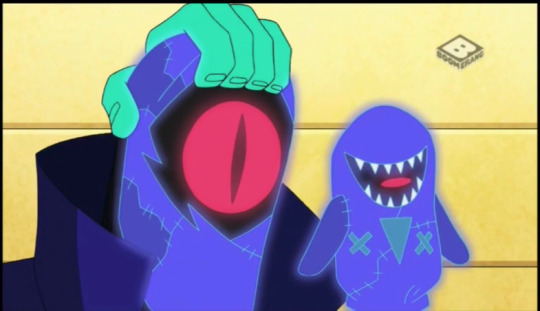
But it didn’t. Instead of being a paradigm breaking shock, this was an old wound for Fred, albeit one he’s perhaps never fully come to terms with. And I was very pleased with Daphne’s echoing of my own thoughts “Oh, now you make sense.” because this does explain a lot about Fred’s own behaviors. More so the longer I thought about it.
(under cut, this got long)
One thing I love was, no matter how much Fred would deny it to Rose or anyone outside the gang, it was obvious he still loved his father very much, he just didn’t know how to deal with him. And Donald Jones/Professor Huh clearly loved him too, as we discover, much like Sirius Black, he broke out of jail for the sole purpose of protecting his son. Also the vulnerability Fred’ shows to the gang. Voicing aloud the fear that he might be as crazy as his father couldn’t have been easy, and was likely something he’d been dreading since early childhood. The fact that he could trust them with it was touching.
Unfortunately for Fred, despite Shaggy’s comment to the contrary, I think there’s some truth in it. In MI Both Ex-Mayor Jones and Brad and Judy Chiles were driven by greed. And while Jones would chose his son’s life over his greed (as opposed tho the Chiles who psychologically tortured their son) both put their greed before his happiness. Unlike them, Professor Huh was not motivated by greed at all. He got nothing material out of his crimes, nor were they based in revenge. His motive was never stated, but I think I can make a guess.
I think Donald Jones suffered from a variant of Obsessive Compulsive Disorder. That his crimes (which were nonviolent nor, as stated, for material gain) were compulsions. (Why the compulsions took the form of unintelligible and impossible crimes I’ll get to in a bit.) I don’t think it’s a coincidence that he chooses a hand puppet to talk through and his costume involves a hand on the back of his head. When he’s acting out on his compulsion, he’s a puppet, not in control of his actions. He may have responded well to therapy, given his awareness, but he didn’t get that and after all this time its probably going to take a lot of work to bring Donald Jones back to who he was. I think in some ways he’s trying, It was established early on the Professor Huh only communicated through his hand puppet, but we hear him speak otherwise throughout the episodes, but only to Fred and his friends. The sentences are non sequiturs with no relation to anything happening, but I think it’s him trying.
And though it manifests very differently, I think Fred has his own obsessions and compulsions he’s dealing with, specifically centered on solving mysteries and making the world make sense. It’s why Cutler knew that he could take advantage of Fred by dangling a mystery in front of him, when all logic and reason would dictate Fred catching him and turning him in. Because he knew when it came to mysteries Fred physically couldn’t help himself. Not that Fred is aware his thought processes are anything but sane and normal. He doesn’t recognize his own obsession for what it is (Which in retrospect makes me a little less mad at him about the Christmas episode. He wasn’t able to properly recognize Daphne’s problem until he’d dealt with his compulsion to solve a mystery)
In the end, though. Fred’s manages to accept his father as he is. The hand puppet scene was such a good one. It both acted as a bookend to the series, the puppets being introduced in episode one, and demonstrated Fred’s sincere desire to reach out to his father.
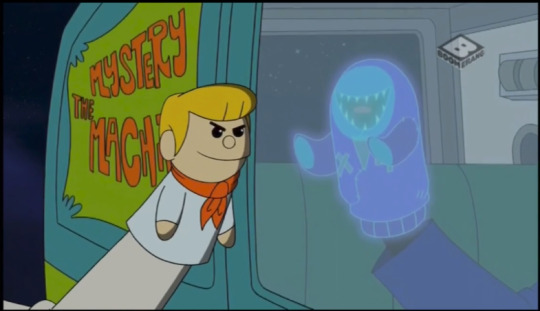
While Professor Huh has difficulty expressing himself in an understandable manner, he is easily able to understand the world around him. Fred could have simply said what he wanted. Using the puppet was a bigger message of acceptance than any words could have been. And it reached him. “It’s time I turned myself in” and “But you love the Mystery Machine” were normal sentences relative to the situation, the first time we’ve heard Professor Huh do that.
They may be on opposite ends of the spectrum in terms of order and chaos, but they love each other very much.
As for the why of the crazy nature of Professor Huh’s crimes, we see it in the barber scene, as for the first time ever Shaggy and Scooby’s ruse is turned back on them. When Professor Huh requests them to use a croissant to put his eyebrows on his shoulders, it’s obviously a nonsensical request, typical of the character, right up until he demonstrates on Shaggy and Scooby.
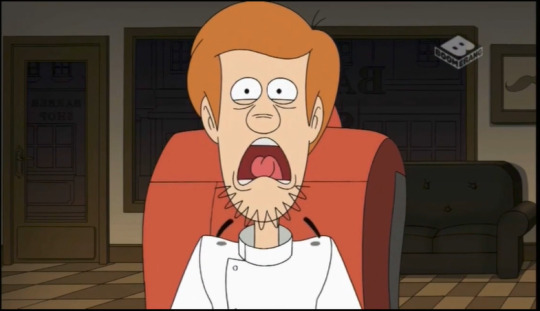
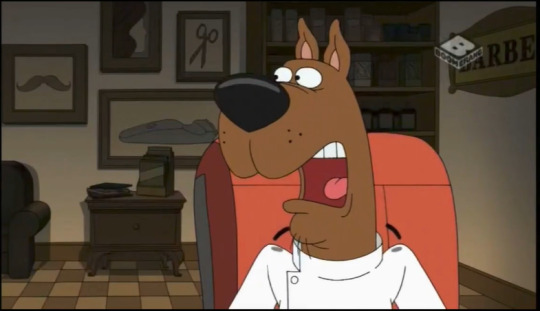
Be Cool had come the closest to calling out what I’ve dubbed Crack Theory A, that Shaggy is a wizard and unaware if it. The thing is, Donald Jones warps reality too, if anything on a larger scale. And I think that’s the problem. Fred describes his father as “...a great father. A computer engineer and one of the most rational people on the planet.” In Goblin King we saw Velma have a total blue screen as being confronted with the supernatural being real. Imagine how much worse she would have reacted if she’d discovered it was real by discovering she was a witch?
Donald Jones pushed the fabric of reality, because he wanted it to push back. He was a man who believed in logic and science and discovered he could ignore them. It’s why his crimes, which were public and elaborate left no clues, they were done with magic. They defied logic and reason, like hotglueing multivitamins to the ceiling of military helicopter carriers, suspending a cruise ship between two buildings, and leaving messages via a llama chewing on a note that would finish eating it the moment it was done being read. They made no sense because there was no objective, other than being as random as possible.
And here’s the kicker. I think Fred’s magic too.
Yes it sounds insane. This is the most ration and grounded we’ve seen since the seventies. Why on earth would I think he’s magic?
The

Mother
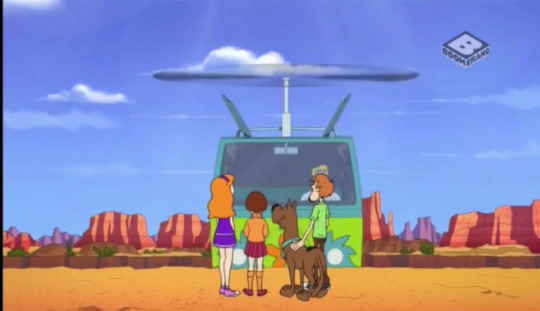
Fucking

Mystery

Machine
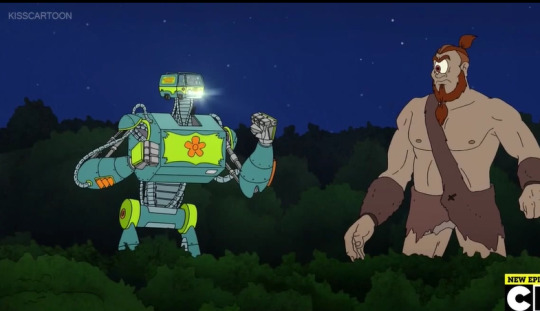
This isn’t even all it’s forms. Not to mention the built in forensics lab. almost all of which is controlled by a button Fred has on a key fob. Button. Singular. And it can be any mode, or he steer it with ease. And yeah, it didn’t attach itself to a mecha, it unfolded into one. The Mystery Machine must be the most enchanted item in the world.
Fred, however, is even less aware he could be magic than Shaggy (since Shaggy at least joked about it) and I don’t think his father would tell him, if indeed that was what was responsible for his own issues.
Actually there’s one more instance that Fred might be magic aside from the Mystery Machine. The sock puppet Fred was made by Daphne in the first episode. It’s the simplest type of puppet, it can talk and waggle it’s arms, but nothing like changing expression. It’s has those serious eyebrows from the moment of it’s introduction. Except in one scene
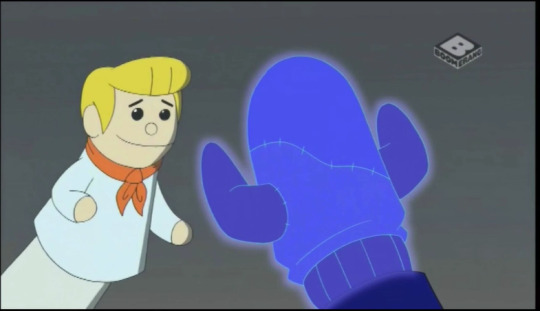
Here’s it’s got a more gentle expression

Matching Fred’s own as he uses it to tell his father he loves him,
#Scooby Doo#Be Cool Scooby Doo#I have thought way too hard about this#And spent too much time writing it#I may lay down for a bit
194 notes
·
View notes
Text
q&a: Kieran
princekierz said:
Hi Cassie. This is about Lady Midnight, not Lord of Shadows, so I may be a little late but anyway. People who hate Kieran are constantly bringing up the fact that he tried to convince Mark that he being with his family again wasn't real in that note he sent him and I really can't understand why he did it? What was the true purpose of that note? Can you please tell me? I love Kieran, and I don't like when people are unfair with him. Thank you.
That's interesting -- I have to admit it never really occurred to me people would be confused by what that note meant/was about. The below contains spoilers but not major ones, so skip if you are avoiding even mild spoilers.
First I should say it’s fine to dislike a character. There is no character I have written or read about that someone hasn’t disliked for some reason. If that character is in a love triangle, multiply that by 100,000,0000000. (That may not be a real number but you get the point.) I’ve been thinking a lot about liking and disliking characters and the act of reading with empathy, which I will get to more at the end of this essay. Right now I’m just going to talk about what that note meant, and the way in which Kieran is a complicated sort of character generally.
We read for lots of reasons. To see our own experience reflected (a "mirror" reading experience) and also to see experiences that are not ours. (A "window" experience.) One of the interesting things about seeing the judgements of Kieran is the expectation that he is meant to act like a mundane human being (one who has dutifully read not just many relationship-help tomes but also all the Shadowhunter books -- thanks, Kieran! -- and is well acquainted with the Blackthorns despite never having met them). At very least, he is expected to act like a Shadowhunter, and not at all like a Faerie – despite the fact that a Faerie is what he is, and as a Faerie, he is not like us. He does not have typical human cultural beliefs about love (in good and bad ways), or commitment — he doesn’t mind at all whether Mark has sex with other people — or what promises mean, or what is personal space (a ridiculous idea to a Faerie.)
Mostly what I've seen complaint-wise about Kieran is that he is manipulative, which is true only to the extent that he has grown up in Faerie, where everyone is manipulative. Because they cannot lie, they have created a complex society of misdirection and manipulation and Kieran, growing up as Prince, would have been raised in the heart of that. He would know no other way to behave, and indeed has only been learning, slowly, different human patterns of behavior. He is actually really terrible at being manipulative — not a patch on Julian, for instance — and mostly he is neither good at it nor does it that often. But we can certainly look at what he has done.
So, on to the note and the vague six words it contains. (I don’t really understand what “he tried to convince Mark that he being with his family again wasn't real” means, because Mark was obviously with his family and not, say, on a balloon tour of Cappadocia. I don’t think even the Seelie Queen would have tried to convince him otherwise, because that is not manipulation, that is waving your arms around yelling “Mark! They're dosing you with PCP! That's not really Ty! It's a huge bunny!" which is not going to work and nobody would reasonably think it would.) So I’m just going to gather that some sinister goal is being implied here and talk about why Kieran did send the note.
Remember that none of this is real. Why did Kieran say that? Because he was worried about Mark and thought it was the truth. Not for another reason. I gather there is an assumption that the phrase "remember that none of this is real" is somehow about Mark's family, but it wasn't. If Kieran had wanted to say “don’t trust your family” or whatever, he would have said that. The note was about the entire world of the Nephilim. Nor was it anything Kieran didn't entirely think was true.
Nor was he entirely wrong.
Kieran was cast out of the King's court because he was well-liked and the King saw him as a threat. He spent his years in the Wild Hunt with Mark watching as Mark's heart broke every single night when he counted out his family's names on the stars. He felt Mark's agony when Mark saw Simon, and thought Simon had come to bring him back to the Nephilim, only to find out the Shadowhunters had abandoned him like garbage. Experiencing the agony of someone you love is worse than experiencing your own. After living through the horror of Mark's despair and crushing loss, is it particularly surprising that Kieran might be wary of Mark getting attached to his family again only to be ripped away from them again -- which is in fact what pretty much everyone in Lady Midnight thought was going to happen? Like, nobody thought this majorly fuckerated offer from the Fair Folk was likely to have a good outcome? Julian was terrified what it meant for the kids and thought it might be better if Mark had never come back? Kieran is unlikely to have a more positive view of the kindliness and honestly of the Clave (or the Courts of Fae) than Julian does.
Here is what Kieran knows to be fact:
Shadowhunters hate Faeries.
Mark was abandoned by his people. The Nephilim, certainly, his family, perhaps. Kieran knows they never tried to get in touch with Mark, and he is unaware of the Blackthorns' complicated circumstances, that they were forbidden to look for Mark, and that they needed to protect Helen. There is no way he would know about those things, unless he had read the books. (Read the books, Kieran!).
He knows the Shadowhunters have enacted the Cold Peace, a series of racist laws punishing Faeries. He knows Mark will be in danger from this.
He has no reason not to think that when Mark is returned to the world of the Nephilim, using his family as bait, they won't chop his damn head off.
That is what Kieran is urging Mark not to think is real. Nephilim promises. The idea that he will be safe outside Faerie in the Shadowhunter world. And Kieran is not exactly wrong either. We are all glad that Mark is back with his family....and if the Cohort gets into power they might chop his damn head off. Maybe he would have been better off back in the Wild Hunt.
Kieran can't lie -- and he can't lie in writing either. He said what he said in his note because he was frightened for Mark, and he wanted him to stay safe. In no way did he mean "Your family doesn't love you," because if he thought that, he would actually have said it at some point, ever, rather than being incredibly vague in a note that, since he has never said anything remotely like "Your family doesn't love you" to Mark, Mark would find incomprehensible. Mark understands the note perfectly, because the idea that Nephilim as a group are not trustworthy is not new to him nor is it a huge surprise Kieran would feel that way. (There’s also a lot of numinous stuff to get into about what real and unreal means to faeries, in a magical sense, but there’s no room here, alas.) Kieran has lots of opportunities to say bad things to Mark about his family if he wanted to, but IIRC he never does.
Misguided is not the same as manipulative. To be manipulative means that you're playing on someone else's hopes or fears to achieve selfish ends without regard for their well-being. But the idea that Kieran is a cold-hearted bastard who didn't mean a word of the note (despite not being actually able to lie) and is a consummate actor doesn't really jibe with anything we actually know or observe about Kieran. Far from having Julian's ability to play others like guitar strings, mostly Kieran blurts out what he means when he means it and never even tries to pretend otherwise. He can be petulant as hell and annoying, showing up to see Mark when he's not supposed to and sulking about whether Mark likes someone else. He can be manipulative in the way he sometimes kisses Mark when Mark is trying to be logical because he's insecure and he trusts Mark's desire for him even when he can't convince himself Mark really loves him (but this doesn’t really work, which is what I mean by Kieran not being great at manipulation). He very foolishly interferes with Mark’s dream in Lord of Shadows because he wants to talk and he thinks giving Mark a dream in which they’re having a friendly conversation means he’ll find out what Mark’s hiding. (Which is another example of him not really understanding human issues. All he wants out of the dream is a talk — “Because you are not truthful with me. Your heart is closed and shrouded. I cannot see it,” Kieran said. “I thought, in dreams, perhaps . . .” — and the dream starts out with them sitting and talking while one bandages the other, and Kieran manages to get in the idea that he knows Mark is lying to him. Things take a sexy turn, but not because of Kieran. He can’t control Mark’s dreams in every detail: if he could, there would be literally zero point in a dream in which he’s hoping Mark will volunteer to tell him the truth. Mark has to have free will in the dream or there’s no point in what Kieran straight-up says the dream is for, and again, Kieran cannot baldfacedly lie. And Kieran is right — Mark is lying to him, in fact the whole family is gaslighting him, which is why it pains Mark when Kieran recalls the phrase “remember that none of this is real.” Because none of it, in this case, IS REAL. Kieran is being lied to by EVERYONE. However, Mark is still right that Kieran shouldn’t be poking at his dreams — and he shouldn’t. Kieran, as a faerie, doesn’t really get that: dreams aren’t private to him, and besides, Mark has allowed Kieran into his dreams before, so Kieran assumes it’ll be okay now, because Mark said it was all right previously. But this is where Kieran needs to learn not to make assumptions, and to value Mark’s privacy even if he doesn’t really get it. Does he? He seems to: he listens to what Mark says, and he never touches his dreams again. In fact, they actually have a pretty useful, healthy conversation about it, though we have to wait until QoAD to see how any breakthroughs they make in LoS play out.)
So yes, Kieran can make spectacularly bad decisions, with the worst of them being when he thought getting Mark hauled back to the Wild Hunt for an infraction was a good idea and wouldn't result in any collateral damage. And Kieran deserves to be blamed and to feel guilty for that, nor do I mean to excuse him -- and I have no interest in doing that; that wrong that he did is a building block of his flawed character. As I saw someone say on twitter the other day, which probably means you've all seen it many times, characters are not all either angelic cinnamon rolls or problematic monsters. Like people, because they are intended to reflect people, they exist on a continuum of behavior: some fail and learn, some fail and never learn, some have good intentions and some bad, some grow and change, some are changed by grief or shock or maturity, some cannot grow and are tragic figures. Committing a manipulative act doesn't damn you forever unless you keep committing manipulative acts forever. If people (and characters) were rendered garbage by past mistakes, there would be no need for therapy or books, since both are about how people learn to change.
As Kieran says: "Everyone is more than one thing. We are more than the single actions we undertake, whether they be good or evil." That was in Lady Midnight, and it's possible he was thinking about the fact that he never tells Mark in that book that the reason he wanted Mark brought back to the Wild Hunt so badly -- the reason he turned Mark in, hoping he'd be dragged away from the world of Nephilim -- was not so that he could date Mark, but because he had been told Mark was going to be murdered. That Mark's head was going to be chopped off NOW. That doesn't excuse his behavior, but it makes it a lot less manipulative in two ways: he actually wasn't acting for a selfish end, but to protect Mark from death, and he never tells Mark that in LM, letting Mark blame him. He lets Mark break up with him and walk away from him with only quiet resignation as a reply. He does nothing to try to make him stay and attempts no manipulation at all, nor is he manipulative when he shows up to help save Tavvy -- he offers help, gives it, and expects nothing in return. Only when Kieran is in shock over having been lied to, and his sudden recollection of his own mistakes, does he tell Mark that he was in fear for Mark's life -- which makes a big difference to Mark, who is able to recognize what that means about why Kieran did what he did.
[Kieran said] “Iarlath had hinted you would not be safe in the Shadowhunters’ world. That they were planning to lure you back, only to execute you on some trumped-up charge. I was a fool to believe him. I know it now.”
“Oh,” said Mark. The knowledge unfolded in him, realization edged with relief. “You thought you were saving my life.”
Kieran nodded. “It makes no difference, though. What I did was wrong.”
(Emphasis mine.) Kieran is flawed, he screws up. He is also capable of acts of great nobility -- his willingness to testify to protect the Blackthorns at the end of LOS being one of them. Kieran spends LOS being lied to and manipulated by everyone around him while his memory is gone. He is trapped in the Institute, a place so full of anti-Faerie magic that it makes him so sick he can barely eat. He suspects Mark is jerking him around in some way, he turns out to be right, and he's still willing to testify in the Blackthorns' defense. He is also able to see when he is/was wrong, and acknowledge it. None of this makes him a perfect person, but it certainly complicates him away from the oversimplified reading that he's a manipulative horrorshow and that's the end of the story — especially when a huge chunk of the story has yet to be told.
My suspicion, since there are plenty of other flawed characters in these books stumbling along messing up, is that Kieran's true crime is being part of a love triangle. Having been through this before I remember well the long essays about how Will was a horrible person and the Wessa relationship was toxic and Jem was a horrible person and that relationship was toxic because dying people should know not to bother other people with their feelings (seriously). That is how people talk about love triangles these days; it seems to be a contest about which relationship is perceived as healthiest, which people are the best and most deserving people of the prize (Tessa, or in this case, Mark). There are a couple problems with that: one that is an unhealthy relationship can become healthy. (It obviously depends on the relationship, some absolutely cannot and should not be fixed, but there would be little need for marriage counselors if relationships could not be made healthier.) The second is that if you want to hate a character, you can convince yourself they are evil even if they spend a whole book saving bunnies, nuns, and salmon who can't find the salmon cannon, so the arguments do get a bit circular after a while. Certainly I have come across plenty of essays about how Cristina is terrible and should go away because Kieran doesn't like her (he does like her) and Mark doesn't want her (not true) and she isn’t so great (I think she is so great and so do they.)
So I will say three things:
1) Kieran is not what is keeping Mark and Cristina apart, any more than Cristina is what is keeping Mark and Kieran apart. Kieran and Mark have a relationship that needs to be worked on to be healthy, and Cristina and Mark have to get to know each other better outside the magic of the binding spell. These things would be true regardless.
2) I know that this essay will garner plenty of people announcing that this means I ship Mark and Kieran or am in love with Kieran, and I know this because this happens whenever I post anything about them, or a piece of fanart of them, even if I post a piece of fanart of Cristina and Mark shortly after. I can only say what I have said for ten years, which is that I don’t ship my own characters or “love” them in the way a fan loves a character — all the characters are pieces of myself in some way or other so that’d feel very odd. I know there may be other authors who feel differently, but I can’t “ship” a couple when I’m primarily interested in their relationships in terms of theme, craft and writing the best story I can — I need the distance of being a reader, not a writer, to “ship” something. (I would also note that male authors rarely ever have people talk about how they’re in love with their characters or they write about them because it’s a “fetish” or “they get off on it”: only women get that narrative, but that’s another post.)
3) I remember reading online that writers should write with "savage empathy." I've always thought that was great advice, as it reminds us to always stay in sympathy with characters and write from a place of their humanity, in all the vastness of humanity’s capability for complexity: for the same person to be capable of immense selfishness and immense nobility, or deep gentleness and great cruelty. It reminds us that we strive to reflect what is human rather than what is either entirely perfect or entirely evil. I feel like it's also been good advice for me as a reader. It reminds me to look at things from the characters' point of view, to not expect them to know what I know,* to remember the circumstances of their lives and the ways in which they may behave differently than I would because of the way they were raised/what their culture prioritizes. It has helped me be less judgmental of characters and while I don't think it's made me unaware of the problematic, I think it's made me a happier reader. Even when I don't forgive, I can understand, and that reminder of the eternal complexity of the human soul, and its capability for change and redemption, has enriched my reading life. It’s wonderful to realize that you can enjoy reading even more than you did before, and I can only hope for the same for all my readers.
*This is why it is pointless to be angry at the Superhero’s girlfriend when he is off saving the city, and you know he is off saving the city but she doesn’t, so she’s just angry he didn’t make it to little Marcia’s bat mitzvah.
2K notes
·
View notes
Text
Do Not Stand At My Grave and Weep
Title: Do Not Stand At My Grave and Weep Characters: Winifred Barnes, George Barnes, Rebecca Barnes, Bucky Barnes, Steve Rogers Rating: General audiences Word count: 3k Warnings: angst. all angst. death (but not really?) Spoilers: none
I am preemptively apologizing for the angst because that is all there really is. Inspired by this post that legit brought tears to my eyes when I first saw it.

They know there is a possibility he’ll never come home again, but God, do they hope he will. Bucky looks so dashing the day he comes home in his uniform, all confident swagger and patriotic duty. He dances around the kitchen with Becca, promising to write every day of every week of every month he is over in Europe. He makes his parents promise to look after Steve, to make sure the punk was doing okay.
“Invite him over for dinner every once in a while, will ya?”
There never is time. No sooner has Bucky shipped out than Steve Rogers seemingly disappears off the face of the earth. Winifred Barnes worries about the young man, never able to see anything but the small, sickly boy to whom Bucky had attached himself like a shadow when they were little. She can’t bring herself to pen a letter in reply when Bucky’s first letter arrives about two weeks later, detailing his arrival in London, asking if Steve was doing okay.
“I’m sending him a letter, too, but I don’t trust the punk to tell me the truth.”
George Barnes has to write back, his wife too concerned that their son would be able to detect her deceit through her script. It’s a generic answer, thanking Bucky for his letter, conveying their relief that he is well, wishing him luck with his relocation to a posting in Italy. Steve is only mentioned in passing. Keeping busy, George writes, we will extend an invitation for dinner this weekend.
The war rages on. They get four more letters before Bucky falls strangely silent. All over America, the face of the war effort coaxes money for bullets, and Winifred catches sight of him on a poster on the way home one day. The eyes peering out from under the cowl look familiar, but she can’t imagine who she’d know that paints such a striking picture. Next to her, Becca titters and fawns a little.
As the days pass and no letter from their son shows up, worry takes root, their household growing solemn. They knew this could happen. George Barnes puts on a brave face, but can’t help the way his heart clenches at night when his wife whispers her prayers, imploring God to keep her son safe and to bring him back. If Becca cries, she does so silently, and without leaving a trace on her pale cheeks.
Winifred all but faints when Bucky finally writes again. It’s never been said, but they had all quietly gotten used to the notion that Bucky wouldn’t come home, that the next letter they’d get would be a condolence letter. So many of them had already been dispatched, families breaking down. They’d already counted ten boys lost in their neighbourhood. To be spared, to be brought back from the brink of incomprehensible grief, it’s a blessing that almost hurts.
Bucky is okay. Bucky is alive.
“I shouldn’t be telling you this, and you have to promise not to tell anyone. Burn this letter if you think it best. Steve saved me. The guy found a way to get here after all, broke into the enemy camp that held me. Did he even come to dinner at all? He’s different now. Bigger. He’s Captain America. Punk outranks me now.”
It takes a while for it to sink in, because every fiber of their being is rejoicing at not having lost Bucky. Sarah Rogers’ son being the hulking body of muscle that toured with the USO registers as barely a blip until much later. They read and reread the letter over and over, crying and laughing at the simple pleasure of seeing Bucky’s script and knowing it means is still alive. He goes on to tell them he’s volunteered for a special squad, going after the Nazi command force that held him and hundreds of others prisoners.
“I don’t know how often I’ll be able to write, but know that I will try. I’m doing okay, and I’ve got Steve with me. If we go down, at least we’ll go down together. Til the end of the line.”
It was a thing that had stayed with them throughout childhood. Steve, so often plagued by illness, sometimes so severe it led Sarah Rogers to their door in tears, not knowing if her son would survive the night. It prompted Bucky to march over, keep the young boy company, curled up next to him, telling stories and making sure his friend stayed calm. To the end of the line, even if it would only mean to the end of the night.
It’s a comforting thought that the family holds onto, because true to his word, Bucky’s letters are few and far inbetween. The ones he manages to send are short, bland, more proof of life than anything else. He can’t talk about his missions, his letters wouldn’t make it through censure if he did. They’re fine, all of them, it’s a promise that he reiterates over and over again in his letters.
His correspondence is spotty at best, letters sometimes arriving weeks apart, sometimes months. They learn to slowly let go of their worry, keeping track of their son - sons, really, now that Steve is there too - through what is reported in newspapers and television spots. Captain America and his Howling Commandos, the fiercest group to ever go up against Nazi Germany. It’s not much, but it’s proof.
It’s been months, not a letter in sight. The news have been filled with reports, but none that matter for the Barnes family. Bucky’s last correspondence talked of an important mission coming up, but it had sounded like it would be short and he’d be back at base soon enough. Rebecca wakes up one night with a horrible sense that something is wrong, anxiously waiting for the mail for the coming weeks. Nothing. Maybe it was just a bad dream, something scary that she didn’t remember once she woke up. Bucky’s fine. They’re fine.
They’re fine.
Until the next letter.
Winifred has seen enough of them, expected her own for long enough that a small part of her feels she should be prepared. It’s an illogical thought because how do you prepare yourself for the message confirming your child’s death? Their names are typed neatly, as is the short statement that their son, James Buchanan Barnes of the 107th, went missing during a highly sensitive mission and has been ruled killed in action.
It hurts because their only son is gone. It hurts because this letter, delayed by circumstances, arrives on what would have been Bucky’s 28th birthday. It hurts because mere hours later every channel on tv and radio declare the same devastating news: Captain Steve Rogers has been declared missing after a mission last week ended in a crash, and is presumed dead. In the span of a couple of hours, Winifred and George had lost the two boys that mattered most to them.
“Are- Will there be a funeral?”
Becca’s voice is muted, her face obscured by the shadows as she peeks into the kitchen where George and Winifred sit at the table. It’s been a little over a week. Time has been… numbing. Unreal. Rushing and slowly lurching at the same time. Some days have felt hollow, like the day Bucky’s and Steve’s names were read at a memorial service for those who’d passed in the war. Other days it has felt like it’s all a dream and Bucky’s not really gone. Then today happened. Bucky and Steve’s personal affects arrived. A small box containing everything the two had left behind. It’s so… little. A few photos, a small notebook they discover contains Steve’s sketches. These two men were so much more, yet left so little to those who remained. They suspect some things have been reclaimed and redistributed. Becca’s question hangs in the air for a few moments while her parents share a look.
“Of course,” Winifred replies, voice stronger and steadier than it has been in days. “Of course we’ll have a funeral. For both of them.”
There are other things that should worry them, but suddenly the funeral for two boys whose bodies were both lost to the war takes precedence. For a fleeting moment, Winifred worries she may have promised too much in saying they’d have a funeral for both Bucky and Steve, but George appeases her, alleviates her concern. An open spot in the family plot, set aside for an aunt that long since moved west. No caskets, because, well… Just a headstone. A reminder that their boys were here, lived and loved and fought and died for their country.
Even with the financial ease their unfortunate deaths brought, it still takes them a while to gather funds. In that time, the army honours Steve with a memorial in Prospect Park. Some would probably think that would be enough. Grand monument right in the center of Brooklyn, but Winifred won’t have it, won’t even go there, keeps setting aside money for the headstone they have decided on. It’s important. Everyone remembers the heroes, but no one truly grieves for the sons they lost. The monstrosity at the park is not for Steve, not for Sarah Rogers’s sweet boy. It’s for Captain America, depicted as a lone figure of justice and courage. The army, the people, they don’t know him, his devotion, his kindness and the friendship with Bucky that he valued so dearly. No, Winifred won’t go to the park memorial, because that’s not a true representation of Steve. Wherever Steve went, there was Bucky not far behind and vice versa. The two belong together, like the brothers-in-arms they were.
In the end, it’s not garish. There is no pomp or circumstance, just three lone figures looking at the white granite headstone that, along with a sketchbook and a selection of photos, is all that’s left of James Barnes and Steve Rogers. The army wouldn’t release the dates of their deaths, saying they couldn’t divulge information about classified operations. The only thing they have is the dated condolence letter and newspapers proclaiming Captain Rogers missing and presumed dead. In the end it’s not the dates that matter, not the ranks preceding their names. It’s the final lines of the epitaph that breaks the camel’s back and brings the walls down for Winifred Barnes.
Devoted friends till the end of the line
The caretaker helps George Barnes lead his wife and daughter down the gravel paths. It will be hard at first to come back, to accept, to come to appreciate the empty grave. The war ends. Becca starts visiting more often, and as time passes Winifred and George both make regular trips, standing in silence before the white granite, pulling out weeds, brushing snow off the stone, gingerly touching their hands to the names.
Years pass. Weeds get pulled. Snow gets brushed away. Their steps become a little heavier, a little stiffer, until they don’t come at all. Within six months, Winifred and George Barnes are laid to rest in the family plot, their names inscribed next to the empty grave that holds but memories. The mourners barely spare the headstone a second glance, but Rebecca lingers. She has a family now, a son that stands with his father a short distance away. She heaves a sigh, pulling away the weed that has started crawling up the pale granite. She’ll have to explain it to her son. Maybe not today, but soon.
Soon is a year later. Soon is a lot harder than she anticipated. She’s almost ashamed that it results in fewer visits, and when her husband gets offered a promotion upstate, Becca smiles and celebrates and wills away the pit in her stomach that tells her she is abandoning something far more important than an easier life.
“How did you even find this place?”
“Research.”
“Bullshit.”
“Hey, we’re in a cemetery!”
Two men approach the plot that has lain abandoned for several decades, their footsteps heavy against the ground.
“Seriously, how did you find it?”
“Jeez, it’s not like I broke any laws.”
“So tell me!”
“I found Rebecca’s things, okay! There was a whole bunch of letters, and one of them asked if she would go to ‘the grave’ when she went back to New York. Thought it was my parents, but they’re not the only ones here.”
“They-”
A strong hand pulls away the weed, bringing two names into the light.
“Wow.”
“This is weird. It’s supposed to be, right?”
“Standing at your own grave? Yeah. We could start a club with Fury.”
“Not in my lifetime, punk.”
Bucky crouches before the headstone, lets the fingers of his right hand run lightly over his name. His parents thought he was dead, hell, the entire world did. Part of him feels uncomfortable, seeing his name on a headstone like this, another part of him feels it is oddly fitting.
“You okay?” Steve kneels next to him, puts a hand on his shoulder.
“Yeah, it’s just…” Bucky swallows, takes a steadying breath.
“Strange, I know,” Steve finishes, letting his gaze rest on his own name. “They buried us together.”
“I found the daughter of the woman Becca wrote to. Took a little time, but she found her mother’s letters, matched it up with the date on Becca’s. Figured maybe Becca wrote something back.”
“And?”
“She didn’t say much. Just that her- our parents made sure there was a place for us, that it was important to them. Becca… She moved away after Ma and Dad died, didn’t come back all too often from what I understood. I don’t blame her. Ain’t nothing here but reminders that she was alone.”
“Hey, we’re not dead, man…”
“Yeah, we are. “ Blinking to keep the tears at bay, Bucky points at their names, their dates, “Those two, they’re gone. We’re… different.”
He deflates, the words to explain this strange sensation blooming in his chest escaping him. This person he is now, the one he’s been piecing together ever so carefully over the past years, is not the young man who went off to Europe to fight a war too big to comprehend. They share a body, but the essence of that man may as well be buried here.
“Then I’m glad they have a place,” Steve remarks, sinking down to sit on his haunches. “Better here than in some godforsaken pit. But Buck… I don’t- I mean, I don’t know about you, but that skinny kid who never knew when to back down? He wouldn’t want us to grieve. Remembering is nice, but he wouldn’t want it to consume us like… like it almost did him.”
It sparks a memory in Bucky’s mind, smaller Steve, lips set into a thin line at a grave not far from where they are now, hands clasped so tightly together Bucky though he was gonna break bones. He lets out a shuddering sigh, swallowing thickly around the lump that has formed in his throat. A place to remember them by, as they were before things went sideways. He can do that.
The grave starts getting frequent visits after that. It becomes a place for them to remember, for Bucky to slowly reclaim memories of the life that fit inbetween the years engraved on the stone. Steve digs out an old photo of their unit, a rare picture where they’re all laughing, Dugan looking like he’s about to break something. The Commandos, so long scattered and gone, come together again, takes their place right next to their Cap and Sarge. They deserve to be remembered too, as they were and not as they were portrayed.
“You know Fury kept all the condolence tags that came with the flowers people put down? Put them in an album and everything.” Steve says out of the blue one day when they’re sitting crosslegged by the grave.
Bucky gives a huff. He’s seen little of Colonel Fury, but the man does not seem like the sentimental type.
“Yeah. Said it was probably the only time he’d ever get to live through his own funeral, so he wanted to take advantage of it. Says you can tell a lot about people by how they remember you in death.”
“Hmm.”
“I browsed through it,” Steve continues, pulling out a tuft of grass and letting it scatter with the mild breeze coming through. “There was this poem, repeated a couple of times. You’d almost think he’d sent himself that one.”
“Yeah? What was it?”
“It was about how your loved ones shouldn’t grieve you when you’re gone, that you’re still here. It was just… fitting. For this.” He nods to the headstone, the framed photo leaning up against it.
Picking a folded piece of paper from the inside pocket of his jacket, Steve reaches out to grab the frame, unfolding the paper and tucking it inbetween the frame and the glass. Next to him, Bucky leans over, looking at the scrawl. It’ll be gone by next rainfall, but the words sear into his mind forever.
Do not stand at my grave and weep I am not there. I do not sleep
“Figured we’d need the occasional reminder.” Steve set the frame back in its place. “We’re still here, Buck.”
Bucky bites the inside of his lip, glancing over at his parents’ grave, their names and dates of birth and death. They never knew he survived, they laid him to rest as best they could. Then again, they never knew the hell he went through, and for that he will be eternally grateful. Maybe this version of him is not the same man they said their goodbyes to, but he’s… part of him. He is not dead, neither is Steve. They’re both here.
“Yeah,” he murmurs, looking back at his own name. “Yeah, we are.”
@loup-malin, @ursulaismymiddlename, @bakexprayxlove, @callamint, @mrshopkirk, @tatortot2701, @ceebeetumbles, @thetalesofmooseandsquirrel, @lenia1d, @andhiseyesweregreen, @basicallybucky, @thatgirlsar, @avengerofyourheart, @booksandshowsandmovies-ohmy, @themcuhasruinedme, @creideamhgradochas, @feepsmoothie, @nuvoleincielo, @wellfuckbuck, @mellifluous-melodramas, @sarahsassafras13, @bovaria, @sebbytrash, @ouatalways, @awaitingjudgementx, @thelastjedl, @4theluvofall, @just-another-fangirl777, @avengingnights, @softwhispers, @therealgingermermaid, @c-maximoffs, @ipaintmelodies, @reniescarlett, @mizzzpink, @winter-in-wakanda, @ourpeachskies, @lenavonschweetz, @beingpeculiarsince2001, @stephanie11220
#bucky barnes#steve rogers#marvel imagine#bucky barnes imagine#steve rogers imagine#my fics#fic: do not stand at my grave and weep
240 notes
·
View notes
Text
Star Wars Episode VIII: The Last Jedi review

*SPOILERS*, but who cares at this point?
I’ve placed a lot of expectation on myself for this review. It’s been through three incarnations already, and I still can’t get it right. It’s muddled, it says too little about too many things, it’s all over the place emotionally, and it needs a good edit.
...Hey then, I suppose in that case it’s perfect, because it’s exactly like Star Wars: The Last Jedi *badoom tish*.
For those that don’t know, I’m a massive Star Wars fan with all the usual caveats applying - not the prequels, not the garbage games, not the Christmas Special. And yet The ‘Last Jedi’ was the first Star Wars film ever released that I straight-up refused to watch. It started with me simply failing to care, and then it became an antagonistic joke to some people who asked me to review it, until finally it turned into a matter of earnest protest - I was not going to pay to see this film, because that way Disney wins. It was only after I realised it was released on a streaming service that my girlfriend had a subscription for that I decided to bite the bullet. I’ve asked myself many times before and since how the hell things could possibly have gotten to this point - to the point that I, the second biggest fan I know, for whom the series was and is a deep and integral part of my life, would simply stop giving a shit?
In the case of The Last Jedi, it began with the mundanity of Disney’s output. Who would have guessed that, after all the prophecies of hope and dread following the corporation’s acquisition of the Star Wars licence, the actual end-result would be that they would simply bore us to death with aggressively average releases? That fact, coupled with the unfathomable laziness of The Force Awakens’ rehashing of A New Hope’s story, and the cavalcade of negative press, reviews, and anecdotes I read and heard in the wake of The Last Jedi’s release hammered the last nail in the coffin with such force, it might as well have been fired directly from the Death Star. For what it’s worth now, it’s immediately clear that even though the prequel trilogy are, by most metrics, terrible films, at least they still very much fit into the Star Wars universe. There’s something about George Lucas’ touch, something that I can’t explain, in that while it stands for nothing in terms of guaranteeing quality, it can at least be counted on to sprinkle originality and imagination over an otherwise well-worn, classic story. George Lucas’ Episode VII sure as hell wouldn’t have been a blatant reboot of A New Hope. And whatever your thoughts on the man, the fact is that without him, we’re stuck in a real worst-case scenario: a bunch of isolated ‘enthusiasts’ writing disconnected fan-fiction screenplays for the corporate zombies on Disney’s board to mutilate in accordance with their latest focus-group data. Mediocre scripts rendered ever-more tedious by a studio intent on watering down anything and everything that might turn someone away, and in doing so, they end up turning away everyone that was looking for something new. For the series that I so adore, this is a fate worse than death. So it is that we end up with Rian Johnson’s crack at the franchise, and so it is that I found myself completely and utterly ambivalent.
I wish I had enough passion in me to savage this film - to create a real spectacle piece, a cathartic script to read for anyone else feeling angry and disappointed. I wish that, after all the waiting and the bemused anticipation, The Last Jedi had made me mad enough to rip it to pieces...but, honestly, I don’t know if it did. I think the overwhelming sensation that filled me when it was all said and done was that it met my expectations exactly. And don’t get me wrong - by most metrics, The Last Jedi is an utter clusterfuck. By most metrics, it’s a terrible Star Wars film. But it’s not like Johnson scorched the earth of the franchise - Disney had more to do with that than he. Johnson’s script simply built itself a weird, amateurish hovel atop a pre-existing ruin. And while I’m not saying that no-one could ever possibly release a good Star Wars film again (even though I don’t think they will), for me - and judging by the extremely lackluster numbers of ‘Solo’, a great deal of others - Disney simply cannot recapture the strange, flawed, wizard-magic of George Lucas and Lucasfilm, and I don’t know if I’m ever going to care about another Star Wars film again.
Yes, it’s that famous nerd-fan hyperbole at play here - I won’t deny that I care more than I should - but I want to reiterate that I’m not so much in histrionics over this particular instalment, but about what the film and its collective flaws represent. The feeling George Lucas got during the test screening of The Phantom Menace - that dreadful understanding that your multi-million-dollar creation is a dog’s breakfast - is a feeling that should have echoed throughout the entirety of Disney HQ when The Last Jedi was first screened. Disney’s fractured, unfocused, haphazard production process is directly mirrored in The Last Jedi’s fractured, unfocused, haphazard final product. Its plot is a mess and filled with holes and unfinished ideas. It’s tone-deaf. Every single attempt at humour is groan-inducing. It’s so fixated on concluding the stories of old, core characters, and yet unceremoniously shovels beloved side-characters into a mass grave; and every single time it tries to introduce someone or something new, they either don’t fit properly into the universe, or the film drops it like a pot of Kevin Malone’s chili into the middle of a confusing series of events, glossing over character’s histories to such an extent that it’s impossible to care about them. Admiral Ackbar is in this film, apparently. I didn’t know that until one of the characters mentions that he’d been killed. Maybe I wasn’t paying enough attention, or maybe they said his name while I was yelling at the TV in incredulous rage, but one of the most revered characters in the series is eliminated with such little fanfare, I didn’t even know he was onscreen when it happened. He’s then supplanted by a commander that was apparently trained by Leia, but has never been mentioned in 40 years of canon. She’s killed an hour later. That’s cool. That was a good decision.
It’s going to be really hard to detail all the missteps in The Last Jedi’s lumbering progression towards its underwhelming end, but I’ll try to relate some of the most impactful. Through an absurd web of barely-connected story threads, we follow Luke Skywalker as he drinks raw milk from an alien’s tit. We see General Hux turned into some slapstick comedy ragdoll existing only to scream incomprehensibly and be dragged around the set by the dark jedi. We see Luke toss his old lightsaber away as if the last time he had it, it didn’t disappear down a bottomless pit. We’re still not given an explanation as to where and how it was found, and we probably never will. We see every side character from the previous film either written-out or killed. We see Leia somehow master the Force to overcome certain death, and it’s never explained how. We see an X-Wing ‘drift’ in the vacuum of space. We see Captain Phasma return as if she’s some kind of nemesis to Finn, only to have her ass kicked by the ex-stormtrooper grunt in a 30-second fight before falling to her presumed death. Leia chastises Poe for being reckless, then immediately sanctions his recklessness. Finn decides that the only way to stop a First Order weapon is to fly into it and kill himself. This does not happen, and there are no consequences. Yoda’s force ghost somehow burns down the site of old Jedi texts, and then the texts turn up unscathed in a throwaway shot later on. A joke prop from A New Hope is given a role of sentimental importance, even though most people won’t even know it ever existed, and won’t therefore have any emotional connection with it - I didn’t, and I’ve watched the film about 30 times. And perhaps most importantly, we see the ‘Resistance’ on the run from an evil entity that somehow crawled out of the ashes of a decimated Empire with enough manpower and capital to finance and build a weapon the size of a literal planet, lost that planet along with all the men and materiel remaining on it, and STILL remains far more powerful than the fighting force and governing power that defeated its every incarnation throughout history. Apparently, eradicating the Empire’s dictatorial command structure and freeing the most influential planets in the galaxy does absolutely nothing to weaken it, and yet the entirety of the armed forces of the new Galactic Republic exists aboard a dozen underpowered ships.
Nothing makes sense. Nothing is sacred. The weakness of J.J. Abrams conceit for Episode VII is revealed here as Johnson intentionally erases every mystery he established and tosses away all the minor characters that glimmered with the faint hope of being something more interesting this time around. He’s stated in interviews that he was trying to ‘subvert audience expectations’, and if your expectation was that the second film in the trilogy would build on the first, he certainly succeeded in that goal. But what story is The Last Jedi trying to tell? Like The Force Awakens, it’s so trapped by the prestige of its past and the burden of creating a future that, in accordance with Disney, must please every single human being alive, that it achieves nothing. When Mark Hamill tells you to your face that he completely disagrees with every single decision you’ve made about a character he’s known and lived for forty years, your decisions probably need a rethink. But Johnson didn’t rethink his decisions, and Mark Hamill is such a boss that he gave it his all regardless. No, The Last Jedi doesn’t scorch the earth. It simply salts the already desolate landscape so that nothing more may grow again, at least from this story-cycle.
So with all this frustration, you might assume that I despised the film...but I didn’t. It has the worst script of any Star Wars film, no doubt - worse in its inept storytelling and its awful, atonal jokes than almost anything Lucas ever wrote – and yet I'd still watch it again sooner than Episode 2. I’d watch it sooner than The Force Awakens. It's stupid, and overlong, and a directionless, muddled mess, but it still has some good moments. I liked seeing Luke, despite the potential of his character being wasted. I liked the idea of a union between Kylo and Rey, even if that too was squandered. I still like Kylo Ren, even if that’s not a popular opinion. As much as Admiral Holdo's character was ineptly shoehorned into the plot, I liked her final scene. Leia carries herself with strength and dignity, and actually gives orders and counsel, as she should. These moments are a drop in a bucket when it comes to tallying the bad vs the good, but they're there, and they’re okay.
But this film cannot be fixed. Rian Johnson has said that J.J. Abrams shared no long-term plans for the trilogy. No shit. For every three films planned, George Lucas had a three-film arc; that’s what tied together even the worst of the Lucasfilm releases. Disney has no such plan. They’re trying to cobble together a trilogy of films without retaining any creative staff, and giving the new people they bring in through a revolving door free-reign to do whatever they want right up until it clashes with the company’s monetisation plan. There’s no consistency. There’s no permanence. There’s no balance or flow between instalments because there’s no unified oversight, and the end result is that every incoming writer has to spend a large portion of their time guessing the answers to questions that the previous writer posed. And Rian Johnson, for his part, has no idea what he’s doing or where he’s going. His contribution to the Star Wars legacy is to undo everything Abrams left for him, retroactively destroying any worth The Force Awakens might have had, and establish nothing for himself. Every film in this new cycle has been a patchwork mess led by an ever-changing roster of freelance writers and directors looking for a million-dollar paycheck. It’s an utter disaster, and Disney can call it ‘canon’ all it likes, but this is not a real Star Wars film.
3/10
#star wars: the last jedi#episode viii#daisy ridley#john boyega#carrie fisher#mark hamill#film#review#cinema#disney#fuck disney#rian johnson
0 notes